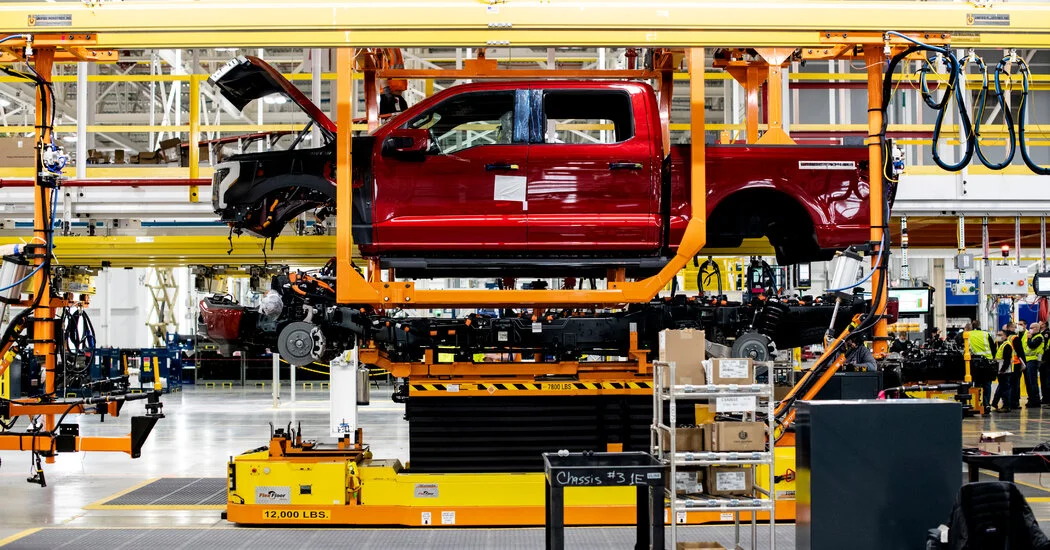- cross-posted to:
- nyt_gift_articles@sopuli.xyz
- climate
- cross-posted to:
- nyt_gift_articles@sopuli.xyz
- climate
Instead of essentially requiring automakers to rapidly ramp up sales of electric vehicles over the next few years, the administration would give car manufacturers more time, with a sharp increase in sales not required until after 2030
…
Ali Zaidi, Mr. Biden’s senior climate adviser, declined to discuss the details of the final regulation. But he said in an interview that Mr. Biden’s climate policies, combined with record federal investment in renewable energy, would still help to reach the president’s goal of cutting the country’s greenhouse gas emissions in half by 2030.



… “This approach is completely unrealistic”
Proceeds as a “missing piece” to basically give an example of what i said. Installing superchargers at most apartments is quite unrealistic, but level 2 & 1 charging will be affordable.
What about anything I said is actually unrealistic? The US government investing in battery tech for cheaper cars?
Incentives for apartments, condos, stores etc to install charging infrastructure so ev owners will never have to think “can I charge my car? And if so where?”
Right to repair so people driving used EVs will know for sure that not only can they guarantee a battery replacement or other part on their 2014 tesla model S, Ford Fiesta Electric, Chevy Bolt, of VW e-Golf, but that the parts & service won’t cost $20k?
Please enlighten me.
What’s unrealistic is supporting the proposal to slow down adoption of EVs and think anyone would invest in infrastructure. You have great ideas that would really help adoption of EVs, except for the part of putting EVs on hold
I said “Good” because at the moment most EVs released in the USA are either gimped in some way like the bolt (55kw) or leaf (most leafs: 100 miles) or are expensive 50-70k luxury performance gods that a 7k govt discount isn’t going to make much more popular with the average earning or price-conscious person, ignoring dealerships, potential insurance rate hikes (heard this was a thing), ev road taxes (wtf), etc are thrown in the way.
I ignored the evs on hold part because even without govt funding for infrastructure & whatnot, EVs & car sales are still as “free” of a market as during the GM EV1 days, & as such EVs will keep coming forth unless Ford, GM, Chevy, etc want their lunch eaten by Rivian, Tesla, Lucid, Fisker & friends.
As consumer reports said, potentially about 1/3rd of Americans have significant interest in purchasing an EV. Being the pessemist I am, and only looking at the 14% of definitely buy on how many car owners there are (230 million or so), that’s still, at this point with all that is there today, at least 30 million people. As prices fall & used evs become more available, that number will rise significantly as it has in years past, and adoption of then subsidized & simple infrastructure will become a more financially advantageous investment than ever before.
In the end, I wasn’t actually asking for a halt or cooling to EV sales. I was asking for a reevaluation of current plans & methods of encouraging adoption.
As you said, most EVs are too expensive. However they’ve been coming down in price, Tesla started a price war, and several manufacturers have more affordable models planned for the next couple years
The incentives put it over the line, especially if you have state in addition to federal.
Charging is quite reasonable for those who own a house, although admittedly more difficult and expensive for everyone else
Honestly, i think our biggest difference is where we look. I am looking at people who cant easily afford a new car period and have to maintain what they got. The 7k tax credit doesn’t really help them. It helps the middle class where a 40k car with 7-10k tax credit sounds like a nice option.
Right now, im confident that if the coming cheaper cars flood in en masse, at first they’ll be bought by the people who took interest with the 7k tax credit, and then as they get sold & enter the used market they’ll be accepted by lower income families looking to save money on fuel and servicing over the years by fixing stuff themselves & just having less stuff which needs fixing.
I am of that income level, so there’s that too.